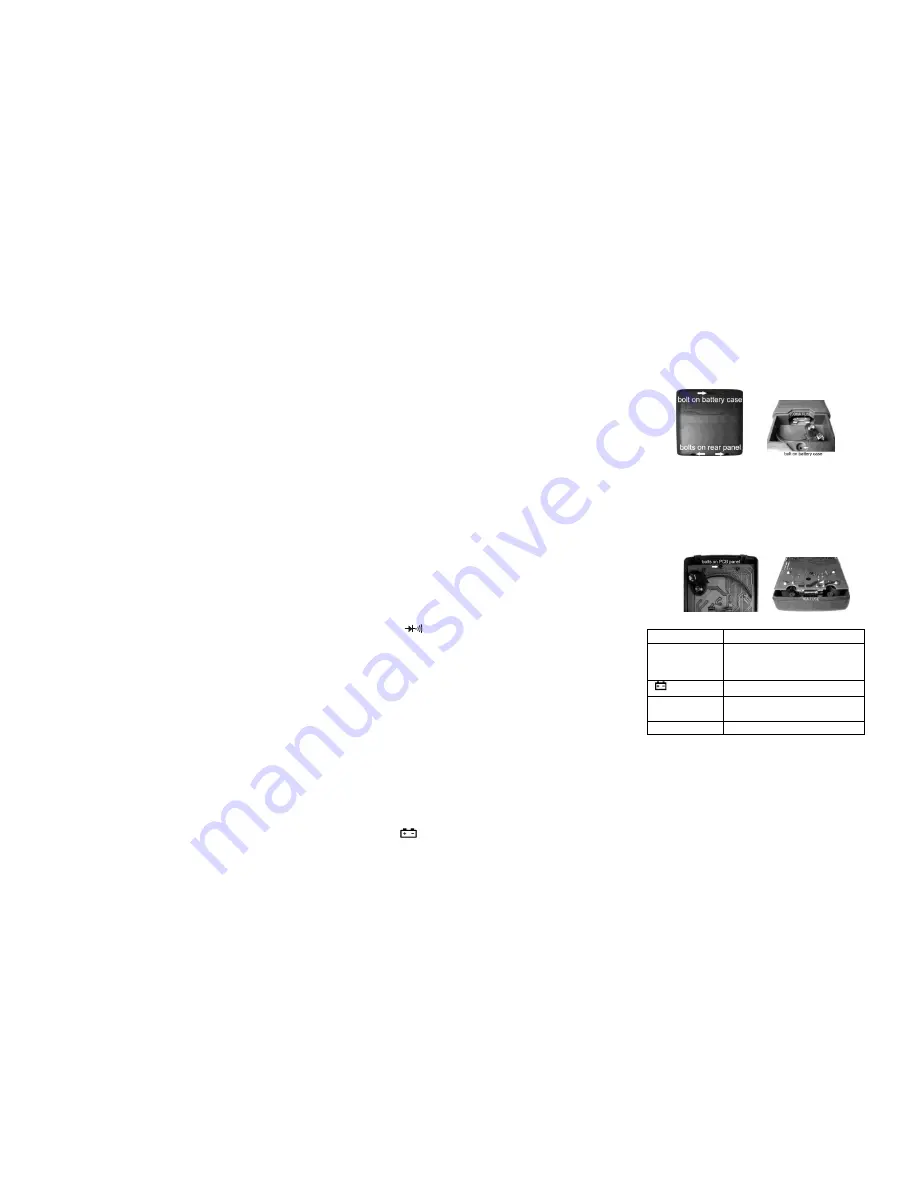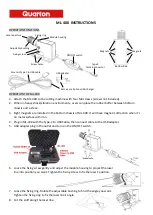
1. If the measured voltage is unsure beforehand, should set the range knob to the highest range,
then, switch to a proper range according to the displayed value.
2.If LCD displays “1”, it means over range, should set the range knob to a higher range.
4-4.DCA MEASUREMENT
4-4-1.Insert the black test lead to “COM” jack and the red one to “mA” jack
(
max. 200mA
),
or
insert the red one to “10A” jack
(
max. 10A
)
.
4-4-2.Set the range knob to a proper DCA range, connect the test leads across to the circuit
under tested, the current value and polarity of the point which red lead connect will display on
LCD.
NOTE:
1.If the measured current is unsure beforehand, should set the range knob to a higher range, then,
switch to a proper range according to the displayed value.
2.If LCD displays “1” , it means overrange, should set the range knob to a higher range.
3.Max. input current is 200mA or 10A
(
subject to where red lead insert
),
excessive current will
blow the fuse. Be careful when measuring 10A due to un-fused. Continuously measuring
large current may heat the circuit, affect the accuracy, even damage the meter.
4-5. ACA MEASUREMENT
4-5-1. Insert the black test lead to “COM” jack and the red one to“mA” jack
(
max. 200mA
),
or
insert the red one to “10A” jack
(
max. 10A
)
.
4-5-2.Set the range knob to a proper ACA range; connect the test leads across to the circuit
under tested.
NOTE:
1.If the measured current range is unsure beforehand, should set the range knob to the highest
range, then set to a proper range according to the displayed value.
2.If LCD displays “1” , it means overrange, should set the range knob to a higher range.
3.Max. input current is 200mA or 10A
(
subject to where the red lead insert to
)
,
excessive
current will blow the fuse. Be careful when measuring 10A due to un-fused. Continuously
measuring large current may heat the circuit, affect the accuracy, even damage the meter.
4-6. RESISTANCE MEASUREMENT
4-6-1. Insert the black test lead to “COM” jack and the red one to“V/Ω” jack.
4-6-2.Set the range knob to a proper resistance range, connect the test leads across to the
resistance under measured.
NOTE:
1. If the resistance value being measured exceeds the max value of the range selected, LCD
displays "1", thus, should set the range knob to a higher range. When the resistance is over 1MΩ,
the meter may take a few seconds to stabilize. This is normal for high resistance readings.
2.When input terminal is in open circuit, overload displays.
3.When measuring in-line resistance, be sure that power is off and all capacitors are released
completely.
4-7. CAPACITANCE MEASUREMENT
4-7-1.Insert the red test lead to “10A” terminal and the black one to “mA Cx” jack.
4-7-2.Set the range knob to a proper capacitance range, connect the test leads to the capacitor
under measured
(
note: the polarity of red test lead is “+”
)
.
NOTE:
1.f the capacitance range under measured is unsure beforehand, should set the range knob to the
highest range, then, set to a proper range according to the displayed value.
2.If LCD displays“1” , it means over range, should set the range knob to a higher range.
3.Before measuring, LCD display might not be zero, the residual reading will be decreased
gradually and could be disregarded.
4.When measuring large capacitance, if creeps seriously or break capacitance, LCD will display
some instability value.
5.Discharge all capacitors completely before capacitance measurement to avoid damage.
6.UNIT: 1uF =1000nF 1nF=1000pF
4-9 .TEMPERATURE MEASUREMENT
Insert the cathode of thermocouple's cold end to "mA "jack and anode
To"COM"terminal, put the working end on or in the tested object, tempe-rature value can be
read on LCD in Celsius.
4-9-1.Insert the black test lead to “COM” terminal and the red one to V/Ω jack (Note: the
polarity of red test lead is “+”).
4-9-2.Set the range knob to “
” range, connect the test leads to the diode under measured,
reading is the approximation of the diode positive volt drop.
4-9-3.Connect the test leads to two points of the measured circuit, if buzzer sounds, the
resistance is lower than approx.(30±20)Ω.
4-10.DATA HOLD
Press HOLD key, the present value will be hold on LCD.
5.MAINTENANCE
DO NOT try to verify the circuit for it’s a precision meter.
5-1.Be ware of waterproof, dustproof and shockproof.
5-2.Do not operate and store the meter in the circumstance of high temperature, high humidity,
and flammability, explosive and strong magnetic field.
5-3.Use the damp cloth and soft solvent to clean the meter, do not use abrasive and alcohol.
5-4.If do not operate it for a long time, should take out the battery.
5-4-1.When LCD displays “
” symbol, should replace the battery as below:
5-4-1-1. Take out the holster and drop out the battery case.
5-4-1-2 take out the battery and replace a new one. It’s better to use alkalescency battery for
long time use.
5-4-1-3.Fix the battery case and take on the holster.
5-4-2.Fuse replacement
To use the specified type when replacement.
5-4-2-1. Take out the holster and drop out the battery case and the battery inside.
5-4-2-2 When you change the fuse of 200mA, please replace a new one as the following fig,
then fit on the battery case, screw on the case and fit on the holster.
5-4-2-3. When you change the fuse of 10A, please take off the 9V battery and the screw fit on
the back shell, then unscrew the fixed screws which showed on the following fig, uncover the
PCB, and replace a new 10A fuse on the position of the small board showed., finally fit on the
battery case, screw on the case and fit on the holster.
(It should operated byprofessional person.)
6. If the meter does not work properly, check the meter as following:
CONDITIONS
WAY TO SOLVE
NO DISPLAYING
Power is off
HOLD key
Replace battery
symbol displays
Replace battery
NO CURRENT
INPUT
Replace fuse
BIG ERROR
Replace battery
ET-
/V1.0




















